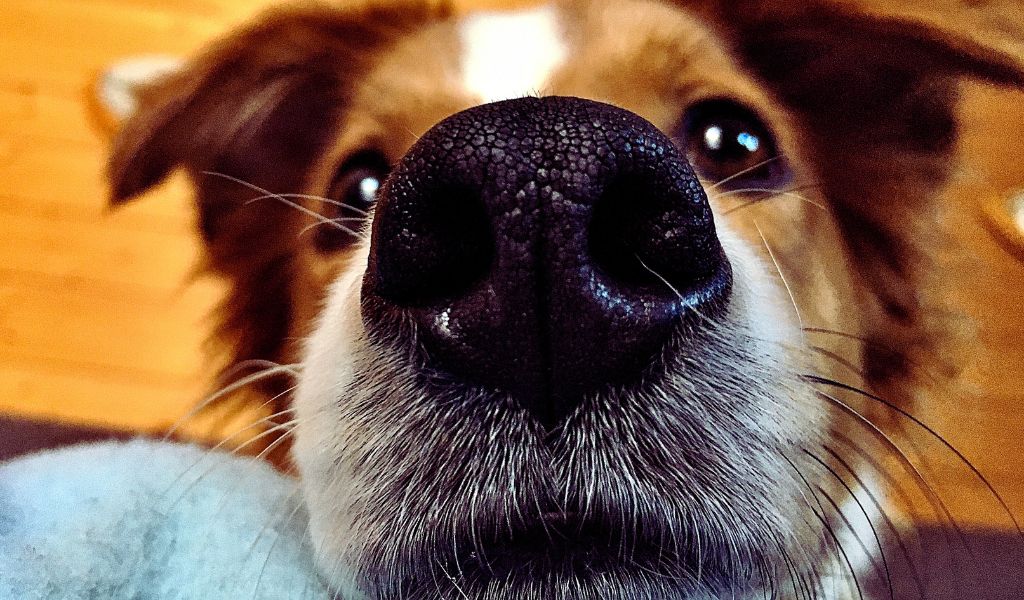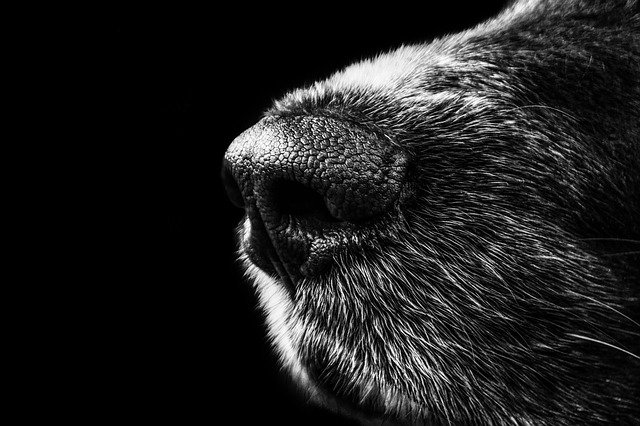For many dog owners and animal enthusiasts, the distinctive black nose of a dog is a feature as familiar as it is intriguing.
But what lies behind this common trait? Is it merely a quirk of nature, or does it serve a greater purpose?
Your dog’s nose is one of the most important areas of his body and the view is that the colour of a dog’s nose helps to protect it from sun damage. Not all dogs have black noses, however, and the colour of a dog’s nose will vary according to his skin and coat colour, his age, genetics and, importantly, his breed. In general dogs with black or dark coloured coats have black noses while those with liver or lighter coloured coats have noses that are brown or that appear red tinted.
Why dogs’ noses are often black
- Genetics and Pigmentation:
- The primary reason for the black colour of a dog’s nose is genetic. Dogs have a gene that codes for the production of melanin, a pigment responsible for colouration in skin and hair.
- Melanin not only provides colour but also offers protection against sun damage. The concentration of melanin leads to darker pigmentation, resulting in black noses in many dog breeds.
- Breed-Specific Traits:
- Certain dog breeds are more likely to have black noses due to specific genetic traits passed down through generations.
- For example, breeds like Labradors, German Shepherds, and Golden Retrievers commonly have black noses.
- Health and Well-being:
- A healthy dog typically has a moist and cool nose, which often appears black. However, the colour can change due to health or environmental factors.
- If a dog’s nose changes colour (e.g., from black to pink), it can sometimes indicate a health issue, but often it’s a normal part of aging or a harmless condition known as ‘snow nose’ or ‘winter nose’.
- Environmental and Climatic Factors:
- Exposure to sunlight can affect the pigmentation of a dog’s nose. Prolonged sun exposure can sometimes lead to a lighter nose in some dogs.
- Seasonal changes can also cause temporary changes in nose colour. In colder months, some dogs’ noses may lighten in colour.
- Protection Against Elements:
- The melanin in a dog’s nose not only provides colour but also acts as a natural sunscreen, protecting the nose from sunburn and other damage caused by exposure to the elements.
- This is particularly important as dogs frequently expose their noses to the sun while exploring outdoors.
Remember, while black noses are common, dogs can naturally have noses of different colours, including brown, pink, or spotted, depending on their genetics and environmental factors.
Do dogs noses turn black?
Most dogs, as puppies, have pink noses and, as they grow older, their noses change colour, eventually reaching a stage where they reflect the colour of the dog.
In many dogs this will mean that their nose will turn black, but there are some breeds that have light or red coloured coats where the nose will turn light brown or even seem to have hints of red or pinkness in the colouring.
Can dogs noses lose their black colour?
Yes and in most cases this is normal and is nothing to be concerned about.
Many breeds of dogs can go through changes in the colour of their nose in line with the seasons, in summer their nose can become lighter and lose some of it’s natural colouring.
In some areas this is called ‘snow nose’, it is often related to the time of year and is harmless.
Often noses that turn lighter in the winter will return to a dark colour when the weather turns warmer and sunny. For many dogs this is a perfectly normal event.
Old age can often be a cause of loss of pigmentation in a dog’s nose, just as he may develop some grey hairs around his muzzle, his nose can also change colouring as he gets older.

How can I blacken my dog’s nose?
If your dog is losing pigmentation in his nose then you can add a natural supplement to his meals which will support his body’s natural colouring.
An ideal supplement to try is the Dorwest Herbs Elderberry and Nettle Extract for Dogs which is enjoyed by many dog owners who have used it to help their dogs to recover their natural colouring.
Why do some dogs have pink and black noses?
This is simply due to the breed of the dog and his natural colouring. Just as a human can have freckles, a dog can have what looks a bit like a ‘freckled nose‘.
Some dogs have a mix of pink and black on their noses and this will vary from breed to breed, again this is perfectly normal for many dogs.

How long does it take for a puppy’s nose to turn black?
By the time your puppy is 8 to 10 months old he will be almost, if not fully grown ( this varies from breed to breed and this is an average time).
When he is fully grown then he will normally have the full pigmentation in his nose which will have turned black – if it is meant to.
Remember that not all dogs have black noses and the colour of your puppy’s nose will depend on his breeding and colouring.
Can a dog’s black nose get sunburned?
It is possible for your dog to sunburn his nose, regardless of the colour, although black noses tend to be better protected from the effects of the sun than lighter ones.
If you see any signs of peeling on your dog’s nose then it is possible that he has sunburn and you should consult with your vet who will be able to provide special nose suncream for him.
You should also do what you would do yourself and keep him out of the sun until it gets better.
Why do dogs have black noses?
Dogs have black noses primarily because of a higher concentration of melanin in their skin.
Melanin is responsible for pigmentation in animals, and in the case of dogs, it results in a black colouration on their noses. The black colour helps protect their noses from the sun’s harmful ultraviolet rays.
Are there any dog breeds with non-black noses?
Yes, there are certain dog breeds that do not have black noses. Some breeds, like the Dalmatian, have spots or patches on their noses instead of a solid black colour.
Other breeds, such as the Samoyed, may have lighter-coloured or flesh-toned noses. These variations in nose colour are primarily due to genetic factors and do not necessarily indicate any health concerns.
Just as people have different skin colours and levels of pigmentation, so do dogs.
Dogs with dark skin tend to have dark and black noses whereas those with lighter skin and coats have noses that are much lighter in colour or even resemble freckles.




